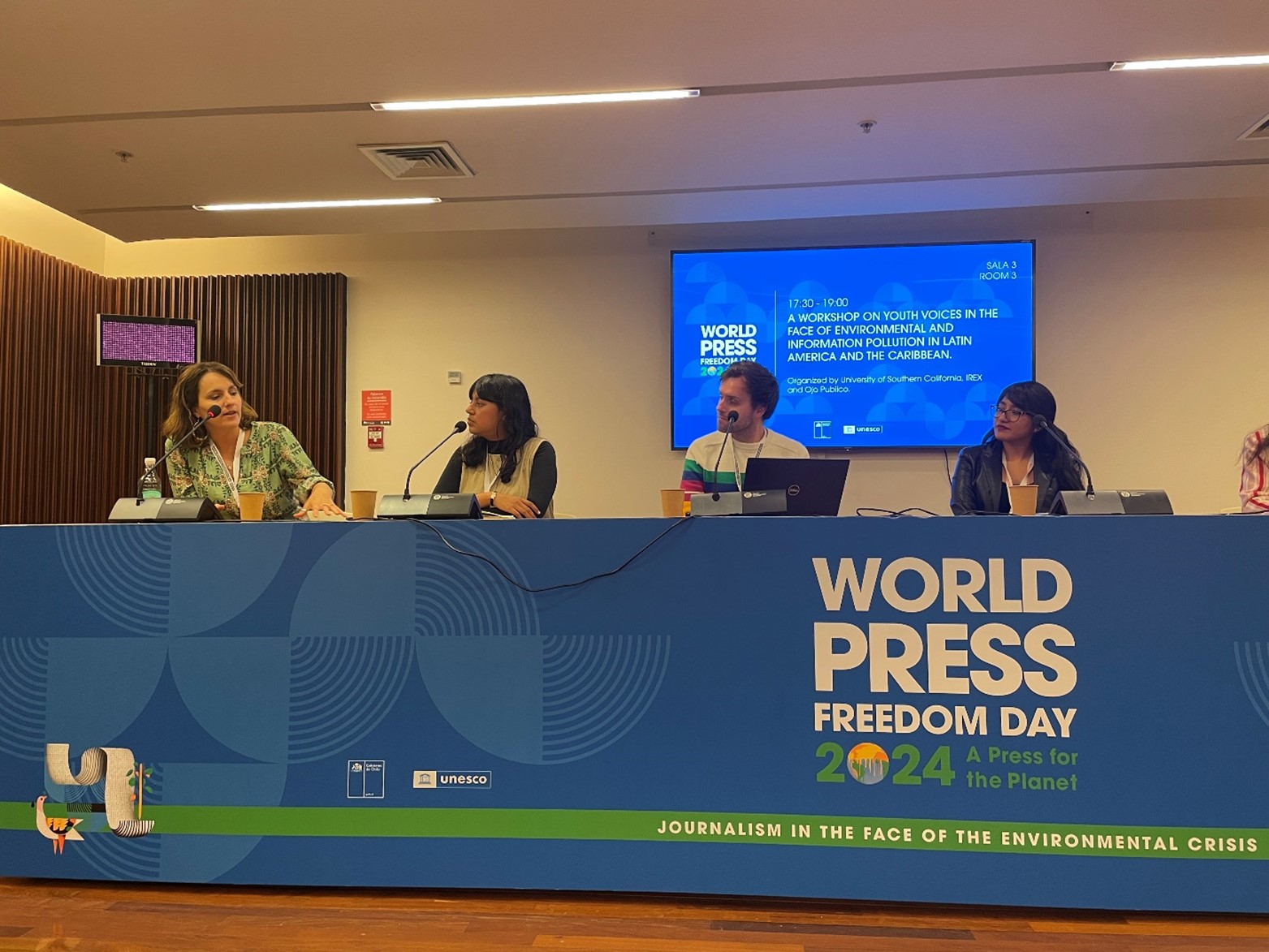Safeguarding journalists: Three insights IREX gained at the World Press Freedom Day conference

Since 1993, May 3 has been recognized as World Press Freedom Day. This annual acknowledgement acts as a reminder to governments of the need to respect their commitment to press freedom. However, in a world where media professionals are continually attacked, the day also serves as a space where individuals in the press and information space can gather to address key issues. This year, the World Press Freedom Day conference was held in Santiago, Chile, with a focus on the environment. Journalists and independent media are vital to bringing awareness about the environmental crisis to the public, yet often face significant challenges in doing so, from fighting information manipulation to experiencing immense risk. During the conference, IREX participated in sessions and workshops, held a side event, and led a session. Below are three issues IREX explored at the conference:
1. Environmental journalists are under attack globally.
The conference theme, which focused on the role of media professionals in environmental issues, highlighted the immense risks that journalists face to their personal safety and wellbeing. In addition to navigating threats, they also grapple with the challenge of translating scientific jargon into content that people who are affected by environmental disasters and new audiences can easily understand.
In the report, Press and Planet in danger: Safety of environmental journalists – trends, challenges and recommendations, discussed in a panel at the conference, UNESCO emphasizes, “At least 749 journalists, groups of journalists, and news media outlets reporting on environmental issues have been attacked in 89 countries between 2009 and 2023, in all regions of the world.” This number is startling, as it clearly demonstrates the perils of environmental journalism are not a regional issue, but rather a global concern.
One key insight from the “Press and Planet in danger” report examined at the conference was that the majority of attacks against journalists covering environmental topics occurred during environmental protests. Ensuring basic holistic security is still a major impediment to building a world of free and independent media professionals that cover environmental topics.
2. Young people are optimistic about addressing climate issues and are eager to contribute to improving their future world.
IREX’s CREDIBLE program, alongside representatives from OjoPúblico and the University of Southern California, led a discussion on bolstering youth and youth-serving media to build more reliable and resilient information ecosystems around environmental issues. This discussion featured youth representatives from CREDIBLE’s network who shared their perspectives on the challenge of highlighting youth voices during conversations about the environmental crisis, particularly in traditional media.
Additionally, the youth on the panel emphasized that media coverage of climate issues often has an esoteric tone, making it feel distant from the real-life ramifications that affect their own lives and their communities. Ensuring that messaging is understandable, accessible, and applicable to audiences will help people act on and share information they receive. The panel also noted the lack of trust in indigenous voices on environmental issues in favor of featuring scientific sources, highlighting the importance of balancing diverse perspectives and trusting the invaluable knowledge of lived experiences.
An expert from the University of Southern California shared tips to effectively communicate about the environment to diverse audiences, including selecting images that add meaning and substance to articles and focusing on stories that address present conditions rather than possible future outcomes.
3. Individualized and adapted assistance is key to ensuring the safety of media professionals
The Securing Access to Free Expression (SAFE) program held holistic safety clinics at the conference offering individualized assistance from experts on digital security, physical safety, and psychosocial wellbeing. Over 45 participants from various countries visited the safety clinic table to access resources on holistic safety. Experts helped eight participants create customized risk mitigation plans including four physical safety risk assessments, two digital mobile device security plans, and two psychosocial wellbeing support plans. The SAFE safety clinics provided tailored solutions for mitigating risks highlighted during the conference, especially those faced by environmental journalists.
World Press Freedom Day reminds us of the critical role independent media plays in building and maintaining democratic societies. This year’s conference theme highlighted the importance of media professionals in delivering high-quality information about the environment and climate crisis. IREX supports environmental defenders and independent media by amplifying youth voices and building skills and knowledge in holistic safety and risk mitigation. As climate change continues to impact us all, IREX remains committed to supporting independent media and voices that provide vital information to the public.